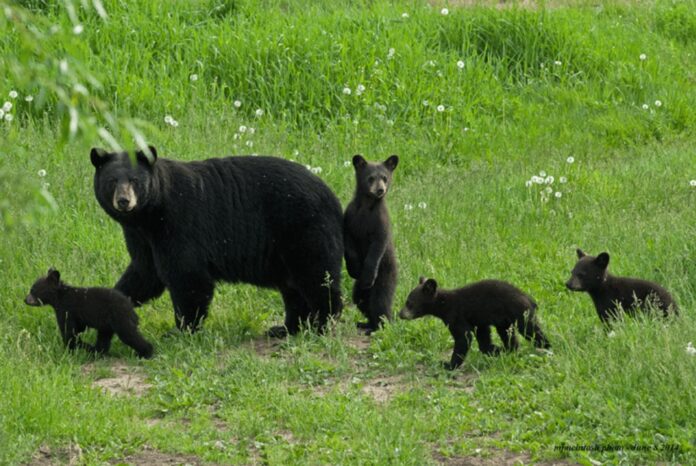Springtime provides exciting opportunities for outdoor activities and wildlife viewing. As the winter months leave and spring approaches both people and wild animals are more active, which allows for unique encounters with wildlife. The spring months are a busy time for wildlife; especially black bears as they emerge from their winter dens hungry and in search of an easy meal. During this time of increased activity it is important for homeowners to secure un-natural food sources to reduce bear encounters on their property.
Natural foods are scarce this time of year, so bears will look for the easiest source of food. Often these sources may be your garbage, compost pile, barbeque grills and pet food stored outside, “The goal is to not make human sources of food easier for a bear to acquire than what nature provides – especially food that is high in fat and calories,” said Nelson Lafon, Forest Wildlife Manager for the Virginia Department of Game and Inland Fisheries.
Bears are naturally cautious of humans, but they can overcome their wariness if people reward them with food – intentionally or unintentionally. Although bears may appear sluggish and thin during this time of the year you should never attempt to feed a black bear found on your property.
Take the following steps to avoid attracting black bears to your homes
- Never feed or approach
- Clean and Secure Attractants including: garbage, food, grills, recycling
- Remove pet or livestock food from areas accessible to wildlife
- Take down bird feeders including seed and hummingbird feeders
- Clean up fallen fruit
- Avoid storing food in your vehicle
“By following these steps, people can prevent most problems with bears,” said Lafon. “Our staff respond to hundreds of situations involving bears every year, and most are due to these attractants.”
It is also that time of year when black bear cubs will be with their mothers exploring the landscape in search of available food resources. During this time bear cubs can become separated from their mothers for short periods of time. In almost all instances no intervention is necessary and the cubs should be left alone.
When a female bear with cubs perceives a threat, whether due to barking dogs, people in the area, or otherwise, she will often “tree” her cubs. While the cubs are still very small (normally weighing 5 lbs or less) they are adept climbers! The cubs will scamper high into the tree tops and await guidance from their mother on when it is safe to come back down.
The female will often leave the area, circling back periodically to check for when she feels the area is secure. If you see cubs in a tree and no female in the area, you should leave the area immediately. The female will return (often at night) and call the cubs back down when she feels there is no immediate threat to her or the cubs. Keeping the area free of disturbance (humans and particularly dogs) is critical for the female to be able to return and collect her cubs.
It is not uncommon throughout the spring for black bear cubs and their mother to return to their den, particularly during periods of inclement weather. Outdoor recreationists may come across an occupied den site (either in the winter or early spring) and should always leave the site undisturbed. The female may leave the den if startled by someone approaching the area. Do not handle or take the cubs from the den area. Leave the area immediately as the female will often return once the perceived threat is gone. This is also an important reminder to always maintain dogs on a leash when hiking so that they don’t spook a bear from the den, or attempt to pick up the cubs.
Never attempt to handle or capture a black bear cub found on your property. If the cub has a visible injury, is lethargic, or has been seen in the same location for more than 12 hours, please contact the Virginia Department of Game and Inland Fisheries Wildlife Conflict Helpline, toll free at 1-855-571-9003 or if after normal business hours your local Sheriff’s office.
For more information on black bears in Virginia, please visit the DGIF website and learn how you can do your part to keep bears wild: https://www.dgif.virginia.gov/wildlife/bear/

